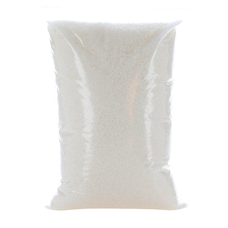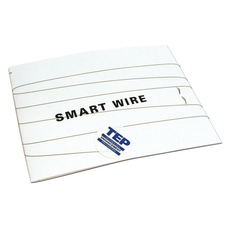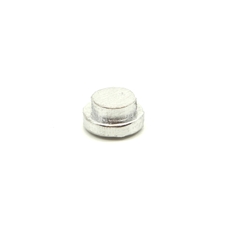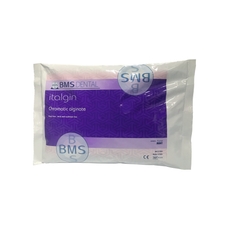Smart Metals Sample Pack (Smart Material)
Smart Metals Sample Pack (Smart Material)
Product code: CP00054317
Product Description
This Smart Metals sample pack contains labelled samples of all the smart metals for evaluation, supplied in a rigid plastic case.
- 1 x Smart Spring
- 1 x Two-Way Memory Spring
- 1 x Smart Wire 0.006″ diameter (125mm)
- 1 x Memory Metal (125mm)
Smart Spring:
At room temperature this spring is soft enough to pull out to approximately 50mm by applying a small force.
When heated to 70°C by passing an electric current through it (or by other means such as hot water or a heat gun, etc), the spring contracts to its original length with a useful pulling force (equivalent to lifting a 0.5kg weight).
- Spring weight: 1.1g
- Dimensions: 20mm (when closed), 5.5mm external diameter. 4mm internal diameter
Two Way Memory Spring:
These remarkable springs, based on a brass alloy, ‘remember’ to open up when heated and close again when cool.
If immersed in hot water at or around 90°C they will open in a split second and close as quickly if dropped in cold water. Such springs have many industrial applications – e.g., in sprinkler and fire damping systems where they replace expensive single-use only fusible links.
- Spring weight: 3g
- The spring is 10mm long, extending to 25mm in hot water.
- 11.5mm external diameter
- 9mm internal diameter
Smart Wire:
Smart wire is a shape memory alloy (SMA) that changes its length with a useful pulling force when a small current is passed through it. The Smart Wire is activated by passing a small electric current through it. It is also affected by temperature.
- 125mm length
- 0.15mm diameter wire
- A mixed pack of examples of Smart Metals and Alloys
- Cross applications in Science and Design Technology classes
- Key Stage 3 Chemistry - Materials: Properties of ceramics, polymers and composites (qualitative)
- Key Stage 4 Chemistry - Structure, Bonding and the Properties of Matter: Smart Materials and Their Properties. Bulk properties of materials related to bonding and intermolecular forces
- Key Stage 4 Chemistry - Atomic structure and the Periodic Table: Characteristic properties of metals and non-metals.
- Can be used to introduce the concept of smart metals and alloys.
Further Information
- Activation Method
- Current / Temperature
- Age Recommended from
- 11 Years
- Age Suitable from
- 3 Years
- Brand
- Unbranded
- Curriculum Link
- Smart Materials
- Material Type
- Smart Metals / Alloys
- Product Type
- Smart Materials
- User
- Staff & Students
This Smart Metals sample pack contains labelled samples of all the smart metals for evaluation, supplied in a rigid plastic case.
- 1 x Smart Spring
- 1 x Two-Way Memory Spring
- 1 x Smart Wire 0.006″ diameter (125mm)
- 1 x Memory Metal (125mm)
Smart Spring:
At room temperature this spring is soft enough to pull out to approximately 50mm by applying a small force.
When heated to 70°C by passing an electric current through it (or by other means such as hot water or a heat gun, etc), the spring contracts to its original length with a useful pulling force (equivalent to lifting a 0.5kg weight).
- Spring weight: 1.1g
- Dimensions: 20mm (when closed), 5.5mm external diameter. 4mm internal diameter
Two Way Memory Spring:
These remarkable springs, based on a brass alloy, ‘remember’ to open up when heated and close again when cool.
If immersed in hot water at or around 90°C they will open in a split second and close as quickly if dropped in cold water. Such springs have many industrial applications – e.g., in sprinkler and fire damping systems where they replace expensive single-use only fusible links.
- Spring weight: 3g
- The spring is 10mm long, extending to 25mm in hot water.
- 11.5mm external diameter
- 9mm internal diameter
Smart Wire:
Smart wire is a shape memory alloy (SMA) that changes its length with a useful pulling force when a small current is passed through it. The Smart Wire is activated by passing a small electric current through it. It is also affected by temperature.
- 125mm length
- 0.15mm diameter wire
- A mixed pack of examples of Smart Metals and Alloys
- Cross applications in Science and Design Technology classes
- Key Stage 3 Chemistry - Materials: Properties of ceramics, polymers and composites (qualitative)
- Key Stage 4 Chemistry - Structure, Bonding and the Properties of Matter: Smart Materials and Their Properties. Bulk properties of materials related to bonding and intermolecular forces
- Key Stage 4 Chemistry - Atomic structure and the Periodic Table: Characteristic properties of metals and non-metals.
- Can be used to introduce the concept of smart metals and alloys.
Further Information
- Activation Method
- Current / Temperature
- Age Recommended from
- 11 Years
- Age Suitable from
- 3 Years
- Brand
- Unbranded
- Curriculum Link
- Smart Materials
- Material Type
- Smart Metals / Alloys
- Product Type
- Smart Materials
- User
- Staff & Students



